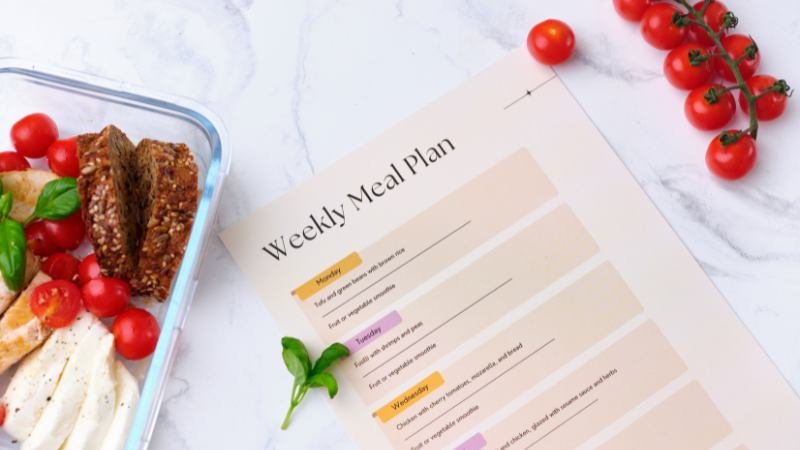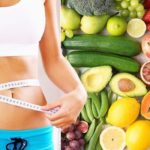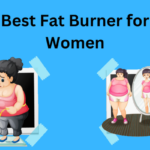Nutrition For Women Over 40: A Comprehensive Guide to a Healthy Lifestyle
Nutrition For Women Over 40: Hormones, Bone Health, Heart Health. Key nutrients, balanced diet, exercise, and mindful eating crucial. Consult experts, track progress for optimal health.

Introduction
As women enter their 40s and beyond, their nutritional needs undergo significant changes. Factors such as hormonal fluctuations, metabolism shifts, and the increased risk of certain health conditions make it crucial to adopt a tailored approach to nutrition. In this comprehensive guide, we will delve deep into the world of nutrition for women over 40, providing you with valuable insights and practical tips to maintain optimal health and well-being.
Understanding the Changing Nutritional Needs
Hormonal Changes and Their Impact
- Menopause and Its Effects
Menopause typically occurs between the ages of 45 and 55, leading to a decrease in estrogen levels. This hormonal shift can result in various symptoms, including weight gain, hot flashes, and mood swings. Nutrition plays a vital role in managing these changes.
- Dietary Recommendations: Incorporate phytoestrogen-rich foods like soy, flaxseeds, and legumes to alleviate menopausal symptoms.
- Thyroid Function and Metabolism
Thyroid function tends to slow down with age, affecting metabolism. Proper nutrition can support thyroid health and maintain a healthy weight.
- Iodine-Rich Foods: Ensure your diet includes iodine-rich foods such as seafood and iodized salt to support thyroid function.
Muscle Mass and Metabolism
Maintaining muscle mass becomes increasingly important as we age. Muscle helps boost metabolism and contributes to overall strength and vitality.
- Protein Intake: Consume adequate protein from sources like lean meats, poultry, fish, and plant-based options like tofu and beans.
Bone Health and Osteoporosis
Post-menopause, women are at a higher risk of osteoporosis, a condition characterized by weakened bones. Proper nutrition can help prevent this.
- Calcium and Vitamin D: Ensure sufficient intake of calcium-rich foods like dairy products and dark leafy greens. Pair this with vitamin D from sunlight or supplements.
Heart Health and Cholesterol Levels
As women age, the risk of heart disease increases. Nutrition plays a pivotal role in maintaining heart health.
- Healthy Fats: Opt for unsaturated fats found in avocados, nuts, and olive oil while limiting saturated and trans fats.
Building a Balanced Diet for Women Over 40
Key Nutrients for Optimal Health
- Calcium and Vitamin D
- Calcium: Aim for 1,200-1,500mg daily, primarily from dairy, fortified foods, and green leafy vegetables.
- Vitamin D: Get 600-800 IU daily from sunlight or supplements if needed.
- Omega-3 Fatty Acids
- Sources: Include fatty fish like salmon, walnuts, and flaxseeds in your diet for omega-3s, which support heart and brain health.
- Antioxidants
- Vitamin C and E: Found in citrus fruits, berries, and nuts, these antioxidants combat oxidative stress and support skin health.
Portion Control and Caloric Needs
Maintaining a healthy weight becomes more challenging as you age. Focus on portion control and caloric balance.
- Caloric Intake: Calculate your daily calorie needs based on your activity level and metabolism to avoid excess weight gain.
Hydration: The Importance of Staying Well-Hydrated
Dehydration can lead to a range of health issues, including urinary tract infections and impaired cognitive function.
- Water Intake: Aim for at least 8 glasses (64 ounces) of water daily, adjusting for climate and physical activity.
Dietary Fiber: Promoting Digestive Health
Fiber aids digestion and helps prevent constipation, a common issue for women over 40.
- Fiber-Rich Foods: Incorporate whole grains, legumes, fruits, and vegetables into your diet.
The Role of Protein in Maintaining Muscle Mass
Protein is essential for preserving muscle mass and supporting metabolic function.
- Daily Protein Intake: Consume 1.2-1.5 grams of protein per kilogram of body weight, focusing on lean sources.
Sugar and Salt: Limiting Intake for Heart Health
Excessive sugar and salt intake can contribute to heart disease and hypertension.
- Limit Sugar: Avoid sugary beverages, and opt for natural sweeteners like honey or stevia.
- Reduce Salt: Cut down on processed foods and season meals with herbs and spices instead of salt.
Meal Planning and Food Choices

Creating a Well-Balanced Plate
Adopting a balanced plate approach helps ensure you receive a variety of nutrients.
- The Plate Method: Fill half your plate with vegetables, one-quarter with lean protein, and one-quarter with whole grains.
Incorporating More Fruits and Vegetables
Fruits and vegetables are packed with vitamins, minerals, and antioxidants.
- Colorful Choices: Eat a rainbow of produce to maximize nutrient intake.
Whole Grains vs. Refined Grains
Opting for whole grains provides more fiber and nutrients than their refined counterparts.
- Whole Grain Options: Choose whole wheat, brown rice, quinoa, and oats over refined grains.
Lean Protein Sources
Protein supports muscle health and keeps you feeling full.
- Protein Choices: Include lean meats, poultry, fish, tofu, legumes, and low-fat dairy in your diet.
Healthy Fats: Choosing the Right Ones
Not all fats are created equal; some are beneficial for your health.
- Healthy Fats: Prioritize monounsaturated and polyunsaturated fats found in olive oil, avocados, and nuts.
Cooking Techniques for Healthier Meals
How you prepare your meals can impact their nutritional value.
- Healthy Cooking Methods: Opt for grilling, steaming, baking, or sautéing instead of frying.
Special Considerations for Women Over 40
Supplements: Do You Need Them?
In some cases, supplements can bridge nutrient gaps, but they should complement a healthy diet.
- Consult a Healthcare Provider: Talk to your doctor or a registered dietitian before starting any supplements.
Managing Menopausal Symptoms with Diet
Certain foods can help alleviate menopausal symptoms.
- Phytoestrogen-Rich Foods: Incorporate soy products, flaxseeds, and legumes to help manage hot flashes and mood swings.
Addressing Bone Health Through Diet
Prioritize bone health to prevent osteoporosis.
- Calcium and Vitamin D: Maintain adequate levels through diet and supplements if necessary.
Strategies for Maintaining a Healthy Weight
Maintaining a healthy weight can reduce the risk of chronic diseases.
- Balanced Diet and Exercise: Combine a well-balanced diet with regular exercise for optimal weight management.
Staying Active for a Balanced Lifestyle

The Benefits of Regular Exercise
Physical activity offers numerous benefits, including weight management, stress reduction, and improved mood.
- Cardiovascular Exercise: Aim for at least 150 minutes of moderate-intensity aerobic exercise weekly.
Combining Nutrition and Fitness for Maximum Results
The synergy between nutrition and exercise can yield remarkable health improvements.
- Pre-Workout Nutrition: Fuel your workouts with a balanced meal or snack.
Low-Impact vs. High-Impact Exercises
Consider your individual fitness level and any joint issues when choosing exercise routines.
- Low-Impact Options: Swimming, cycling, and yoga are excellent low-impact exercises that reduce stress on joints.
- High-Impact Choices: Running and high-intensity interval training (HIIT) can provide cardiovascular benefits but may not be suitable for everyone.
Strategies for Overcoming Common Challenges
Dealing with Cravings and Emotional Eating
Emotional eating can be a challenge, but mindful eating techniques can help you manage it.
- Mindful Eating: Practice being present during meals, savoring each bite, and listening to your body’s hunger cues.
Eating Out: Making Smart Choices
Maintaining a healthy diet when dining out is possible with careful menu selections.
- Menu Planning: Check restaurant menus in advance, and opt for grilled or steamed dishes with plenty of vegetables.
Meal Prepping and Planning for Busy Schedules
Planning and prepping meals in advance can save time and help you make healthier choices.
- Weekly Meal Prep: Dedicate time each week to prepare healthy meals and snacks to have on hand.
Mindful Eating and Stress Management
The Connection Between Stress and Nutrition
Stress can lead to poor dietary choices, but understanding the link can help you make better decisions.
- Stress Hormones: High stress levels can increase cortisol production, leading to cravings for unhealthy foods.
Practicing Mindful Eating
Mindful eating encourages you to focus on the sensory experience of eating.
- Slow Down: Eat slowly, savoring each bite, and appreciating the flavors and textures.
Techniques for Stress Reduction
Managing stress is essential for overall health and well-being.
- Stress Reduction Activities: Explore stress-reduction techniques like yoga, meditation, deep breathing exercises, and spending time in nature.
Monitoring Your Progress
Keeping a Food Diary
Keeping track of your food intake can help identify patterns and areas for improvement.
- Journaling Benefits: Document what you eat, when, and how you feel to spot trends and make necessary adjustments.
Setting Realistic Goals
Setting achievable goals is key to long-term success.
- SMART Goals: Ensure your goals are Specific, Measurable, Achievable, Relevant, and Time-bound.
Tracking Your Nutritional Intake
Various apps and tools can help you monitor your nutrient intake.
- Nutrition Apps: Consider using apps like MyFitnessPal to track your daily intake of calories and nutrients.
Healthy Recipe Ideas for Women Over 40
Check out these nutritious recipes tailored to the needs of women over 40:
- Salmon and Quinoa Bowl
- Ingredients:
- 1 cup cooked quinoa
- 4 oz grilled salmon
- 1 cup steamed broccoli
- 1/4 cup diced tomatoes
- 1/4 cup sliced cucumber
- 1 tablespoon olive oil
- 1 tablespoon lemon juice
- Salt and pepper to taste
- Instructions:
- Cook quinoa according to package instructions.
- Grill salmon until cooked through.
- Steam broccoli until tender.
- Assemble the bowl with quinoa, salmon, broccoli, tomatoes, and cucumber.
- Drizzle with olive oil and lemon juice, then season with salt and pepper.
- Ingredients:
- Kale and Chickpea Salad
- Ingredients:
- 2 cups chopped kale
- 1 cup cooked chickpeas
- 1/4 cup diced red bell pepper
- 1/4 cup diced red onion
- 1/4 cup crumbled feta cheese
- 2 tablespoons balsamic vinaigrette dressing
- 1 tablespoon olive oil
- 1/4 cup toasted pine nuts (optional)
- Instructions:
- Massage the kale with olive oil to soften it.
- Combine kale, chickpeas, red bell pepper, red onion, and feta cheese in a bowl.
- Drizzle with balsamic vinaigrette dressing and toss to combine.
- Top with toasted pine nuts for added crunch.
- Ingredients:
- Mango and Avocado Smoothie
- Ingredients:
- 1 ripe mango, peeled and pitted
- 1 ripe avocado, peeled and pitted
- 1 cup Greek yogurt
- 1 cup unsweetened almond milk
- 1 tablespoon honey (optional)
- Ice cubes (optional)
- Instructions:
- Add mango, avocado, Greek yogurt, almond milk, and honey (if desired) to a blender.
- Blend until smooth and creamy.
- Add ice cubes for a chilled, refreshing texture.
- Pour into a glass and enjoy!
- Ingredients:
These nutritious and delicious recipes provide essential nutrients and are tailored to support the health and well-being of women over 40. Enjoy these meals as part of a balanced diet for a vibrant and fulfilling life.
Seeking Professional Guidance
Consulting a Registered Dietitian
For personalized nutrition guidance, consult with a registered dietitian.
- Expert Advice: A dietitian can assess your specific needs and create a tailored nutrition plan.
Medical Check-ups and Health Screenings
Regular check-ups with your healthcare provider are essential for monitoring your health.
- Preventive Screenings: Ensure you undergo recommended screenings for conditions like heart disease, diabetes, and bone health.
Nutrition For Women Over 40 Conclusion
In conclusion, nutrition for women over 40 is a critical aspect of maintaining health and well-being during this life stage. By understanding the changing nutritional needs, building a balanced diet, staying active, and practicing mindful eating, you can optimize your health and enjoy a vibrant, fulfilling life.
Remember, it’s never too late to make positive changes to your diet and lifestyle. Empower yourself with knowledge, seek professional guidance when needed, and take proactive steps towards a healthier and happier you.
Additional Resources and Further Reading
Recommended Books
- “The Menopause Diet” by Larrian Gillespie, MD.
- “Bone Health: Osteoporosis and Osteopenia Solutions” by Sydney Lou Bonnick, MD.
- “The Mindful Diet” by Ruth Wolever, PhD, and Beth Reardon, MS, RD.
Online Communities and Support Groups
- Menopause.org: The North American Menopause Society offers valuable information and a supportive community.
- National Osteoporosis Foundation: Find resources and connect with others concerned about bone health.
- MyFitnessPal: Use this app to track your nutrition and connect with a community focused on health and fitness.
Frequently Asked Questions (FAQ’s)
FAQ 1: What are the key nutrients women over 40 should focus on?
Answer: Women over 40 should prioritize calcium, vitamin D, omega-3s, antioxidants, and protein for bone, heart, and overall health.
FAQ 2: Can diet help manage menopause symptoms?
Answer: Yes, a diet rich in phytoestrogen-rich foods like soy and flaxseeds can help alleviate menopausal symptoms like hot flashes.
FAQ 3: How can I maintain a healthy weight after 40?
Answer: Maintain a balanced diet, engage in regular exercise, practice portion control, and consider consulting a registered dietitian.
FAQ 4: Are supplements necessary for women over 40?
Answer: While it’s best to get nutrients from food, supplements may be needed for specific deficiencies. Consult a healthcare provider for guidance.



